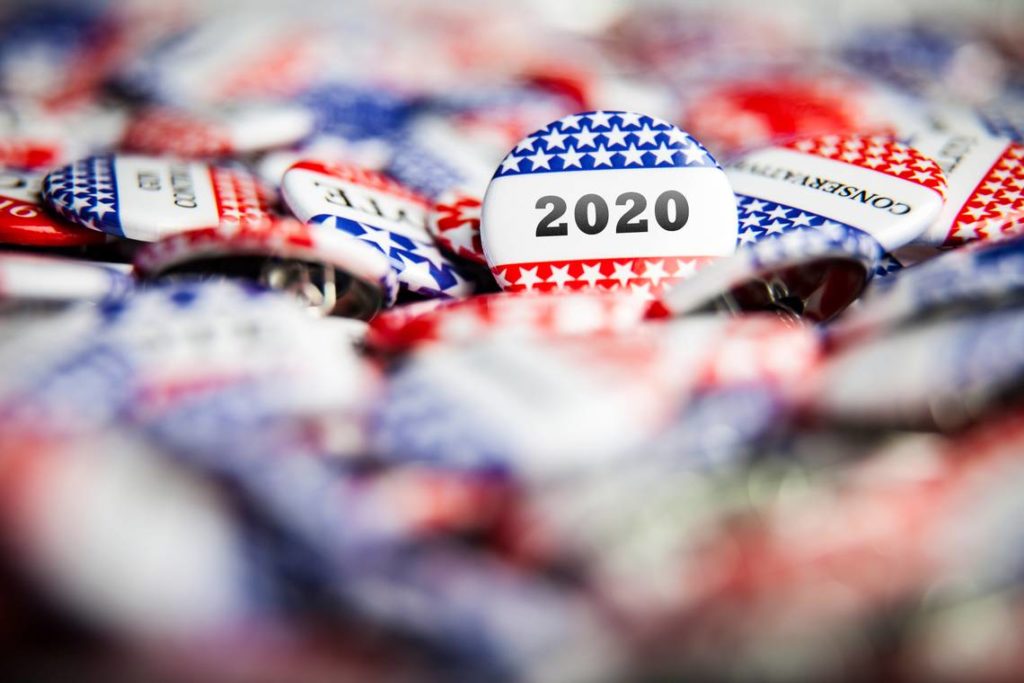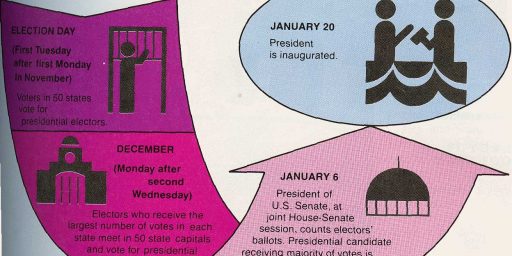Some Context for Biden’s Win
Looking back on the last three decades of presidential elections. (Part 1: the popular vote).

A major inspiration, although not the sole one, for my post Facts over Feelings was a narrative that I am seeing from various places (including the comments section here at OTB) that suggests that this was a really close race and/or the Democrats need more inspiring candidates.
Below are data from presidential elections from the last three decades starting with 1992. For each I have at least the percentages won by the top two candidates and the popular vote gap between the winner and the loser. I have more complete tables for 2008, 2012, and 2016 because that was where I initially started this post. All links are to the FEC, so anyone who wants more info can go there and get it.
Note: I am fully aware that the national popular vote has no legal significance. However, I think it is an important metric in determining actually national support for a candidate and their party. It also helps us understand the overall reality of the given electoral cycle. I would also note that looking at the national data helps underscore how the Electoral College, and the way it is approached by the media, shapes the narratives we consume.
I subtitled that previous post “that narratives are narratives and data are data” because it was becoming obvious to me by Friday that the narrative created by the electoral college and the speed at which the votes were counted.
Consider: if the nation had known at midnight eastern that Trump had won PA instead of finding out at close to noon eastern on Saturday, how different would that have changed the narrative from “close” election to “not so close”? What if we had known the GA was likely to be blu eby the wee hours of Wednesday morning?
The point being: often timing and drama of reveal trump what the data actually mean in our minds.
Let’s consider Biden’s popular vote situation (I will come back to the EC later) at the moment. Acoording to CNN is as follows:
| Biden | 74,045,519 | 50.4% |
| Trump | 70,318,956 | 47.8% |
That is currently a gap of 3.7 million.
This gap will almost certainly grow (keep in mind that CA still has 23% of its ballots yet to count and that in general the slower precincts nationally tend to be populated urban areas, because they have more votes, and those areas tend to go Democratic).
The estimates I have sen suggest that the final gap would be between 5 million and 8 million.
Symbolically, at a minimum, that isn’t close. But, of course, the raw numbers are less significant than the percentages.
Biden current leads by 2.6 percentage points, which is close but not all that close in a two-person race in a country with a two-party duopoly. It is decidedly closer than the polling averages suggested and closer than Democrats who wanted a clear repudiation wanted to see. (Both observations require analysis in their own right).
Keeping in mind that the gap in percentage is likely to grow in Biden’s favor, let’s just out the current numbers in historical context.
Let’s consider 2004, which is the only time in the period under discussion that the Republicans won the popular vote (despite winning three terms). Bush beat Kerry 50.73% to 48.27% (or by 2.46 percentage point). This is close to where we are at the moment.
Let’s also consider 2012, which is close to where the final results may end up. In that contest, Obama beat Romney 51.06% to 47.02% (or by 3.86 percentage points).
If memory serves, we knew those results pretty quickly, and that quashed narratives of closeness. I do recall Kerry looking good early that night in 2004, but that changed pretty quickly. Looking at just the number now, with the distance of time, they look like decisive wins. I do not recall late nights watching returns in 2004 nor 2012.
At the end of the day, 2020 looks like it will shape up to being very much like 2012 (and, I would note, with the challenger being victorious over an incumbent). That is not an outcome wherein it is logical to assert that the winning party chose its candidate poorly nor that they really need to reassess their message.
Put another way: if Biden’s 2020 victory against an incumbent is interpreted as a cautionary tale for Democrats, how does one square than assessment in comparison to 2012? Granting that 8 years is a long time in politics, I think that the comparison is worth keeping in mind.
I will note that inn terms of the Electoral College, Obama won 322 EVs in 2012 versus Biden’s likely 306. However, I will come back to the EC in a seperate post.
Bottom line: 2020 is a solid win for Biden and is comparable to both 2004 and probably even moreso 2012. I think this is important when people try to draw sweeping conclusions.
BTW, it is worth noting that Clinton 1996 re-election at 8.53 points could be seen as a blow-out, as was Obama’s 7.28 gap in 2008. However, Clinton only won 49.24% of the popular vote (the blow-out gap with Dole being due to Perot’s second run at the office) and in 2088 Obama won 52.93% of the popular vote. Biden is likely to register close to that 52.93% as a total vote share.
All of this is needed for assessing the race, not just the media and personal narratives we swim in.
For comparative purposes, here are the percentage point gaps between the winner and loser from 1992-2016 (and the current number for 2020). Negatives indicate EV/PV inversions.
| 1992 | 6.56 |
| 1996 | 8.53 |
| 2000 | -0.51 |
| 2004 | 2.46 |
| 2008 | 7.28 |
| 2012 | 3.86 |
| 2016 | -2.09 |
| 2020 (current) | 2.6 |
Back to the popular vote totals for the moment, it is true that Biden will have won the Most Popular Votes Evah. And I fully understand why he and his supporters will want to tout that. But, it is worth noting that Trump will have won the second more pop votes ever. These numbers are a combination of turnout but especially population growth over time and don’t mean as much as the winners like to claim.
For fun, here is the ranking in the millions of votes (using the current totals for Biden and Trump). Not surprisingly, they are all from the most recent elections (and Obama’s 08 number sticks out at third seeing as how it is the oldest).
| 1. Biden 2020 | 74.0 |
| 2. Trump 2020 | 70.3 |
| 3. Obama 2008 | 69.5 |
| 4. Obama 2012 | 65.9 |
| 5. Clinton 2016 | 65.8 |
| 6. Trump 2016 | 62.9 |
1992: Clinton 43.01%, Bush 36.45%, Perot 18.91% (5,805,344 gap)
1996: Clinton 49.24%, Dole 40.71%, Perot 8.40% (8,203,602 gap)
2000: Gore 48.38%, Bush 47.87% (537,179 gap)
2004: Bush 50.73%, Kerry 48.27% (3,012,166 gap)
2008:
| Obama | 52.93% | 69,498,516 |
| McCain | 45.65% | 59,948,323 |
| Other | 1.47% |
Popular vote gap: 9,550,193
2012:
| Obama | 51.06% | 65,915,795 |
| Romney | 47.20% | 60,933,504 |
| Other | 1.74% |
Popular vote gap: 4,982,291
2016:
| Clinton | 48.18% | 65,853,514 |
| Trump | 46.09% | 62,984,828 |
| Other | 5.73% |
Popular vote gap: 2,868,686






This is a small pet peeve of mine. Trump was constantly bragging about the best stock market ever and the best economy ever, by which he presumably meant highest GDP. Trump’s predecessors did the same, along with many other people in other contexts. But, as you note about turnout, these things are largely a function of population growth. Short term noise or a major disaster aside, we ALWAYS have the biggest economy ever, and the Dow is perpetually at a new high. And turnout in ‘24 will likely be higher than ‘20. It’s like taking credit for your six year old being bigger than he was at five.
@gVOR08: Agreed all around.
One of my hobbyhorses is the way history judges presidential candidates retroactively based on whether they won or lost. If you won, that means you were a master-class candidate running a virtuoso campaign; if you lost, that means you were bumbling and awkward and made one unforced error after the next. This belief functions in a self-reinforcing loop, because it’s used to construct the popular narratives about past candidates, and those narratives in turn are used to bolster the belief. Outside of political science, people rarely question this belief, because it appeals to people’s sense of self-determination, so that they don’t have to accept the unsexy reality that the outcome of elections often hinges on factors beyond any of the candidates’ control, such as the economy or how long the incumbent party has been in power.
What I find interesting is that 2020 could be an exception to this rule. People’s expectations for Trump losing in a rout were so high that Dems are underwhelmed by the results, and I’ve been seeing the kind of recriminations you usually associate with a party that just lost an election. Maybe it’ll fade as the dust settles. And for what it’s worth, I have been hearing the kind of retroactive puffing-up of Biden’s candidacy like what I described above. I don’t know what the history books will say; maybe they’ll judge Trump as so uniquely awful that any candidate who ran against him was simply lucky. And it could turn on how Biden’s presidency goes.
The national vote should count. (This explicitly argues that the EC should be binned which is impossible in the near future.)
A vote in a true blue state like California or in a ruby red state like Idaho carries less weight than it should if we had a national plebiscite for President.
The current system undervalues CA and ID votes because of winner take all by state. It is pop vote by state and not in national aggregate.
If you live in a closely divided state your vote counts much more in margin than those where one party dominates.
All that is needed is 50% + 1. Anything more than that 1 is meaningless noise to the EC. (assuming just two parties for simplicity and ME and NE)
A system that weights one vote marginally over another based on geography was our choice in 1776. Today I call it fundamentally flawed and unjust.
It rubs me raw. Every vote over 50% in each state is essentially meaningless.
Besides I am sick and tired of explaining this to foreign friends every four years. I describe the stupid system. That’s stupid they say. Yes, I know. Change it to something normal they say.
That would require a constitutional amendment and here are the requirements. They are flabbergasted.
I will go to my grave advocating for a national popular vote and for full rights for D.C. because it is more democratic, just, and equitable.
It won’t happen. But it should.
@Kylopod:
Yes. That is one of the narratives I am talking about. There are a number of people who have been talking about Biden as if he lost. And yes, maybe that will fade.
I do think that if we, as a country, had the map we are going to end up with on Weds morning, the perceptions of the election would be different than appears to be the case at the moment.
It’s interesting to note that in 1980 Ronald Reagan won 50.7% of the popular vote and got 489 votes (granted, a 3rd party candidate won 6.6% of the vote, skewing things; from what I’ve heard political scientists have a very difficult time determining who John Anderson “took” votes from). Biden should hit roughly the same percentage but will most likely get a touch over 300 EV’s. Noteworthy because one of the arguments in favor of the EC is that it magnifies popular vote wins, turning a tight popular vote margin into a EC blowout. But what we see now, and will continue to be more and more problematic as demographic shifts play out, is the EC doing the exact opposite: narrowing the EC results as the popular vote outcome becomes more and more one-sided.
@Paine:
I think absolute share of the popular vote is less relevant than margin. Reagan had a 9.7-point lead over Carter, so a substantial EC lead was to be expected. I agree that even then, 489 seems overly lopsided (more on that in a moment), but I would expect him to do better in the EC than Biden, simply because his margin over his opponent was wider.
Exit polls indicated that Anderson took from both, but more from Carter. Now, Reagan’s lead over Carter was wider than the entirety of Anderson’s vote, so obviously Anderson did not spoil the entire election for Carter; however, there’s a case to be made that he spoiled specific states (such as Massachusetts) that Reagan won very narrowly with Anderson getting a significant share of the vote.
Trust the NYT needle more? Tuesday evening it was projecting GA to Biden by 0,2%. Biden now seems likely to win GA by 0.2%
Nate Cohn has a pretty interesting take on PA, MI etc. https://twitter.com/Nate_Cohn
@Kylopod:
People were misled by polls showing the Dems would win the Senate, perhaps 52-48. Lots of disappointment there.
@Kylopod:
A corollary of the Great Man Theory of history.
As the shaded colors on the map whipsawed my emotions on Tuesday and Wednesday and especially as Trump complained about “late” dumps of votes etc I just kept thinking that we would be better off if results weren’t announced as partial tallies. Other than lack of ability to delay gratification I can’t think of a reason that results are announced before 100% of the votes are counted
@gVOR08:
Yup.
All of this is a reminder that the candidate does not matter as much as we like to think it does.
@Erik: We need more uniform counting processes and deadlines.
Also: it is weird that we rely on news agencies to make the calls.
@charon:
True, but that doesn’t necessarily reflect on Biden. I’m seeing attacks on Biden because he “only” won 300 EVs. Have we ever seen this narrative about a winning candidate before? Maybe 1976, when Carter eked out a win after previously having had a 30-point lead in polls (albeit as part of a post-convention bump, rather than right before the election, when the polls were fairly accurate).
@de stijl:
Campaigns pay attention to swing states: Ohio, Pennsylvania, Florida, Michigan, Wisonsin. The bigger the better.
Low pop states, or states where the outcome is essentially predetermined are ignored.
The system encourages this. Demands it.
The President is the President of all of us not just where the most winnable swing votes are.
If you live in Florida your vote costs the candidates time, attention, and dollars. If you live in Hawaii you are absolutely ignored because the outcome is obvious. No one campaigns there. Why would you?
The system determines how resources are allocated. It’s wrong.
A national plebiscite is more just and would change how and where campaigning would happen.
I wanna see folks try to earn every vote, as opposed to every vote in only 7 – 10 states. It is structurally flawed that we have shitty elections.
Red states and Blue states is fucking bullshit on toast.
@Kylopod: There’s a joke around the internet that my daughter (a huge Star Wars fan) loves to quote: “Star Wars fans hate Star Wars”
I think there’s a parallel principle: “Democrats hate Democratic candidates”.
@de stijl:
Indeed. And as an aside, there’s a lot of talk about how bad the polls were. The confident reactions of the Biden campaign as we went into extended uncertainty seem to have implied they had pretty good polling on those states, and GA.
One thing I noticed about this election which has not yet gotten a lot of attention is that the probable electoral map is a tie in number of states: 25-25. The last time this happened was 1880. There have been only two elections in which the winning candidate carried fewer than half of the states: 1960 and 1976. That could happen again this year, if the count in AZ or GA flips back to Trump.
In any case, this situation is not as unlikely as it might seem. We’ve come close to it several times in the 21st century. If Gore had prevailed in Florida, he’d have won the election with just 21 states. If Kerry had carried Ohio, he’d have won with just 20 states. Hillary would have had a 23-state win if she’d just held onto WI, MI, and PA.
Also, note that Trump won 30 states last time, more than Obama ever did, even though Obama’s wins were much more impressive electorally (not to mention popularly). This points to something broader, which is that Republicans have a higher number of states solidly in their column. Dems, on the other hand, have more of the large-population states, even though they’re fewer in number. This is part of what creates the current EC skew between the parties.
@Jay L Gischer:
Some years ago I read a blog post elaborating on that idea. It was quite funny. Unfortunately, the post no longer exists, though I did save it somewhere.
Is that really the case? We loved Obama. And Republicans didn’t seem to care for McCain or Romney.
I think what’s more accurate is that Republicans fall in line much more reliably than Dems. They whine about RINOs, but they still come out to vote for them. The left uses purity tests as an excuse not to vote for the Dem. These are generalizations, but I think they’re broadly true.
@Kylopod: We love Obama now, but there was plenty of unhappiness with him while he was in office. Also plenty of pushback with Hillary, etc, etc.
The hate that comes with Star Wars fans only happens because they love Star Wars so much, and yet they can see its flaws so plainly, which they hate.
I think this translates.
True as far as it goes, but given we have a de facto binary election, “support” can be anything from complete support to the “lesser evil” to straight-up negative partisanship.
In my own case, I would have preferred one of the younger moderates for the nomination, but Biden was probably 3 or 4 on my list. I wasn’t dissatisfied with the choice. Others obviously have a different take, however, particularly progressives who were disappointed that Bernie didn’t win. They are likely to be must less supportive of an actual Biden administration than I am.
Additionally, I’m not sure if there are any numbers, much less good numbers, but I think it’s safe to say that a non-trivial amount of Biden’s support was actually a vote against Trump. In my own circle, I know plenty of people who have no love for Biden but voted for him simply to get rid of Trump.
So “national support” is a tricky thing.
Not sure if this is a reference to the convo in a recent thread, but I don’t think the Democrats chose its candidate poorly. But Biden is just one candidate and the Presidency is just one race, albeit the most important. Biden won decisively, but the GoP frankly did better than the Democrats almost everywhere else. IMO those races, at least in aggregate, need to factor into any claims about national support for a particular party.
@gVOR08:
IMO, the fair measure would be the percentage of elegible voters who vote for a particular candidate.
I don’t have the numbers available, but very likely this would place FDR at the top, since he won four elections. Next should be Grover Cleveland, who won only two elections, but won the popular vote three times.
An even fairer measure would be the percentage of elegible voters who vote for a candidate, but only when there’s universal suffrage. This would mean really only after the voting rights act passed last Century, as before then either women or minorities or both were disenfranchised.
@Kathy:
Andrew Jackson also won the popular vote three times (though that’s a little tricky, since there wasn’t a popular vote in all states at the time).
@Kylopod: Appreciate your insights, K.
@charon: The author states that Trump won PA. He did not.